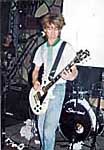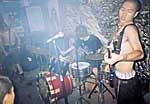"All is chaos and the situation is excellent" -Mao Zedong
The Great Helmsman was not referring to the state of the Internet in
China in the run-up to the new millennium, but his words perfectly describe
the opportunity and anarchy of Chinese cyberspace as the 21st century
dawns.
Like Chang'an Avenue, the Internet is continually under construction,
backed up with traffic for hours on end, and difficult to navigate.
But it is exactly this chaotic state that makes the Internet and the
PRC resemble a gold rush where the young and intrepid can dream of staking
a claim that brings fame and fortune.
The Birth of Chinese Cool
The worldwide commercialization of youth culture is another phenomenon
that has enabled hip young people to turn their cultural advantage into
profit.



Elvis Presley probably started it all: since
the rise and fall and rise of The King, slick marketers have known that
cool equals cash. Young people who spend money on records and blue hair
dye also spend money on fashionable clothes, drinks, magazines and under-arm
deodorants.
While Janis Joplin's public drinking bouts were making Southern Comfort
famous, and the jackbooted antics of British punks were ensuring the
popularity of Doc Martens, Chinese youths were serving as the foot soldiers
of the Great Proletarian Cultural Revolution (1966-1976). At the Gang
of Four's urging, the Red Guards engaged in popular countercultural
pursuits such as struggling against reactionaries and going down to
the countryside to learn from the peasants. Needless to say, the 1960s
were not the epitome of cool in the Middle Kingdom.

The Asian financial crisis notwithstanding,
the 1990s have seen the birth of Chinese cool. And the numbers of cool
contenders are growing faster than was ever possible because they are
propagating their cachet over the Internet.
The Digerati Are Coming
Qiu Shuang is 19 and typical of the first generation of Chinese Internet
entrepreneurs. He was 15 when he saw his first computer. This was in
1995, when a huge number of Qiu's peers in America were already computer
game masters with several years of experience on their parents' home
computers. Now a history student at Beijing United University, Qiu was
17 when he helped start www.ihw.com.cn/rock, or RockChina, a bilingual
website about Chinese rock music. Qiu's high school friend Wang Tianjing
started the site and asked Qiu to help him write copy and find content
for the site. Before long, Wang and Qiu were working with classmates
Zhong Yuan and Zhang Jia.

The foursome got a deal with Info Highway (a
local Internet service provider or ISP) for free Internet time and web
hosting services in exchange for web design work.
When they started working together, only Wang knew how to construct
a website, but now all four can perform the basic programming necessary
to put text and images on the World Wide Web.
We Don't Need No Education
Beijing-born Qiu is from an average, working class family that had a
hard time keeping him clothed in the early 1980s. All of his skills
are self-taught. He cut his digital teeth playing video games on a friend's
computer and when he was 17 his mother bought him a personal computer.
"I was always running around outside at that time, I didn't like to
hang out at home, but after my mom bought me that computer, I stayed
at home more, and that is when our website really took off," he says.
"I've been listening to rock music since high school," Qiu says, "so
I create most of the content for the site." Hoping to bridge a gap between
foreign rockers and the local rock music scene, Qiu and his friends
kept a foreign audience in mind when creating the site.
"At first we were all such idealists, we thought if foreigners have
a chance to hear Chinese music on the Internet, maybe they will come
to China to see concerts live, and the Chinese music scene will grow
internationally," Qiu says with an ironic grin about his optimism.
RockChina's site
includes rock news, band pictures, demo music and a rock forum. The
forum is one of Qiu's favorite features.
"A lot of friendships are made that way," he says. "It is not a chat
box, but it is a place where people exchange ideas about Chinese rock
'n roll.
We talk about music, record companies, and sometimes literature," says
Qiu, who is currently reading a Chinese translation of Jack Kerouac's
'On the Road.'
"Maybe I'll write about a concert or an underground band and other people
comment on the band, or maybe they were at the show too," he says. An
uncensored forum for sharing ideas and disseminating underground music,
web culture is a unique medium in mainland China. RockChina also helps
underground bands sell their demos on line, but doesn't take any cut
from the sales. "We don't want to make money off of underground bands,"
Qiu says.
The demo songs on the site include tracks by local Beijing bands Reflector,
Anarchy Boys, Brain Failure, You Daoshi and Sensitive Flower. "When
I first heard Chinese punk rock bands, I thought it was the greatest
thing," Qiu says. "It really shocked me. So I wanted to put demos of
underground bands on the Internet, and make it available to the world."
Bringing Home the Bacon
RockChina is not a commercial website. There are no advertisements and
the website's teenage creators have no immediate plans to make any money
from the site. The project is funded by freelance website design. One
of their most profitable projects was an English-language website for
China's National Science Foundation. The RockChina foursome took two
months to design the site, a job that netted them RMB17,000 in 1999.
Not bad for four high school students.
With their web design skills, English-language ability and zeitgeist
savvy, Qiu and his colleagues could get good jobs long before they graduate
from university, but they don't intend to go professional for a while
yet.
Nonetheless, they are aware of the commercial possibilities of the Internet.
"I admire other websites like Chineserock.com" Qiu says, "they have
a lot of advertisements."
Turning Cool into Cash
Chineserock.com is another
Beijing-based website about Chinese rock started by enthusiastic young
entrepreneurs. The brainchild of 24 year-old Texan David O'Dell, who
came to Beijing because "they don't speak Chinese in Texas," Chineserock.com
is a commercial website. Although the site does have plenty of advertisements,
very few of them are paid for and the company is a long way from being
profitable. This is typical of Internet companies, new and old. Web
businesses are - at present at least - valued by their potential to
make money rather than their actual revenue. Judging by its negative
cash flow, Chineserock.com is on track to becoming a successful Internet
company. But what is the business model?

Started in 1998 by O'Dell, Chineserock.com
is a bilingual, online music magazine that features local and international
music news as well as an online Chinese record shop called Digital Records.
O'Dell has a full-time Internet-related day job, but he has big plans
for his fledgling website.
Chineserock.com has a staff of 10 including a professional webmaster,
full-time marketing manager and journalists (mostly local musicians)
writing up interviews and record reviews. The site aims to become the
most comprehensive source of online information about contemporary Chinese
rock, and thus attract page views by appealing to fans, musicians and
music industry executives. A large loyal readership would give Chineserock.com
access to information about a very particular group of consumers. Record
companies and manufacturers of youth-oriented products like Levis jeans
and Pepsi-Cola pay good money for reliable statistics about this target
audience: young people with disposable income.
O'Dell's experience as a bassist playing with punk bands in Beijing
has given him an insight into the way the music business works in China,
knowledge which helps him precisely tailor the website's content to
suit a local readership. Most of Chineserock.com's international music
news is provided by arrangement with Sonicnet, a leading U.S.-based
Internet music provider recently acquired by Viacom. But what interests
American viewers may cause local readers eyes to glaze over with boredom.
"Joan Baez touring the United States isn't going to be relevant to a
reader in China, but Metallica's new album release may be of interest
to Chinese readers. You have to know the market to be able to gauge
that," O'Dell explains.
The other arm of Chineserock.com's business is Chineserock.com Digital
Records which plans to promote and sell music over the Internet. The
business is based on a digital format for storing sounds known as MP3.
The MP3 format compresses music into packets of data that are easy to
send over the Internet and be replayed with CD-like quality.
Selling music over the Internet is still in its infancy even in the
west, but it promises to be the next killer app, the technology that
people like musicians David Bowie and Chuck D. are betting will change
the entire music industry.
O'Dell is a true believer in the advantages of MP3 for both bands and
fans. "We help bands record and distribute, but we do it all on line.
That way we don't have the expense of cutting albums, pressing CDs and
all of that. So the band gets a third to half of any sale."
Digital Records has not yet signed any bands, but O'Dell intends to
start by representing bands that already have contracts with traditional
record labels.
"[Beijing rocker] Dou Wei has plenty of CDs and tapes, but he has no
representation on the Internet. And we plan to represent unsigned bands
in Beijing," O'Dell adds.
Chineserock.com is currently leading a campaign against digital music
piracy. Many Chinese music websites have MP3 sections where fans can
download music. According to O'Dell the vast majority of these are illegal
pirated versions. As well as notifying webmasters if their sites contain
pirate MP3s, Chineserock.com ensures that all the music on their site
is there by legal arrangement with the artists. "Most are samples, not
full songs," says O'Dell.
"If our artists agree to a full song, so be it, they are forewarned
about the risk that people can freely pirate their song. Usually signed
artists and labels allow us to provide our largely Chinese audience
with sample lengths of songs, plenty to let users listen and decide
whether to buy the album, on or offline."
In a recent meeting with China's own King of Rock, Cui Jian, O'Dell
showed the musician how anyone with an Internet connection could download
pirated versions of all of his songs from every album for free. Once
the songs are downloaded, cheap computing technology makes it a matter
of hours to cut a CD and have it out on the streets selling for around
¥10.
To combat rampant piracy, Chineserock.com is engaged in compiling lists
of pirate music sites on the Internet, in the hopes that at least branded
Internet companies will remove links to sites offering free pirate music
for download.
Go To?
O'Dell and his team are currently looking for investment to expand their
site.
"No one else has the team we have to do music online in China. We have
the respect of the musicians, the industry professionals and of course
the fans," O'Dell emphasizes.
RockChina's Qiu may end up being part of the same team. He has already
written for Chineserock.com and doesn't see O'Dell's site as competition
because RockChina is a not-for-profit undertaking. Qiu himself says
he is really interested in writing music journalism, but the RockChina
team have put together a business plan seeking RMB4 million investment
for an Internet-based broadcasting station. That may stretch the imagination,
but the Internet revolution is facilitating developments in the PRC
that seemed unimaginable only a few short years ago.








